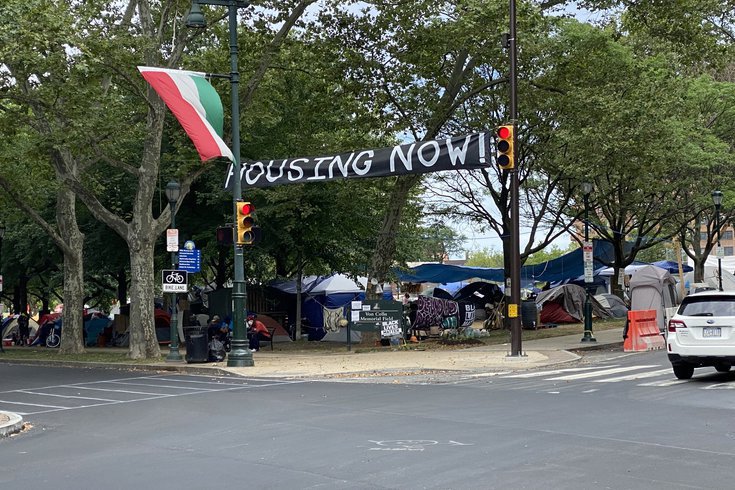
August 18, 2020
 HUGHE DILLON/for PhillyVoice
HUGHE DILLON/for PhillyVoice
Philadelphia held off from clearing the homeless encampments on the Benjamin Franklin Parkway and Ridge Avenue after posting a formal notice for them to end by 9 a.m. on Tuesday morning.
The status of two Philadelphia homeless encampments near the Benjamin Franklin Parkway and on Ridge Avenue remained uncertain into Tuesday afternoon, with last-minute negotiations and a request for a federal injunction delaying city action to remove them.
After the city posted a formal notice yesterday to clear the encampments by 9 a.m. Tuesday, organizers with Philadelphia Housing Action asked the court to intercede and temporarily prevent the city from clearing out people and their belongings at the two locations.
The two encampments materialized in June, together serving as a protest and dwelling site for approximately 200 homeless residents in the city. The organizers contend that Philadelphia's shelters and temporary housing options have proven inadequate, particularly during the COVID-19 crisis. The demonstrators have demanded permanent housing and immediate action to address chronic homelessness.
When negotiations broke down on Monday, city councilmembers Kendra Brooks and Jamie Gauthier requested an opportunity to extend talks with the protest organizers, writing a letter to Mayor Jim Kenney asking him to stop plans to remove the encampments.
"The city has spent a great amount of time and energy working toward securing long-term housing options for the residents of the encampment and addressing the affordable housing crisis in Philadelphia," Brooks said in a statement. "Clearing the encampments will undo so much of that work and cause great harm to community members who have already been disenfranchised and traumatized by the housing crisis."
On Tuesday morning, residents of the Parkway encampment assembled with barriers, cones and boards to resist anticipated attempts by the city to move them out.
But despite the notice to clear by 9 a.m., there was no apparent enforcement action taken by the city.
.@PhiladelphiaGov set a 9am deadline for a homeless encampment along the Ben Franklin Parkway to disperse. As of now it doesn’t appear as though anyone has left. Supporters are blocking access to the park with barricades, cones and boards @CBSPhilly pic.twitter.com/DGexC8RMXc
— Howard Monroe (@HMonroeNews) August 18, 2020
Mayor Kenney said Tuesday afternoon that the city was only required to post the formal notice of the city's intent. There was no immediate deadline that required the city to end the encampments. The mayor previously delayed a similar notice in July in order to extend negotiations.
Even after city officials said negotiations had reached a stalemate, Kenney said he gave Brooks and Gauthier the opportunity of taking another run at the issue before moving in to end the encampments.
"I don't want a confrontation," Kenney said Tuesday. "I was never looking for one. Hopefully we can end this amicably."
The city has received more than 400 complaints from residents in neighborhoods surrounding the two encampments.
Near the Parkway encampment, called the James Talib-Dean (JTD) Camp, complaints have ranged from violence to public defecation, drug use and the prevention of youth sports activities.
Camp Teddy, located near Philadelphia Housing Authority headquarters in North Philadelphia, has delayed the construction of a grocery store.
Kenney, who participated directly in negotiations over the last month, said the conversation stalled because protest organizers insisted all of their demands be met. Though the city agrees there is a dire need to address the housing crisis, the mayor said the encampment leaders' position has created an impasse.
"During the course of our conversations, we've agreed to at least 20 different requests of this group," Kenney said. "More than 20, actually. Their response, basically, is that unless we meet all of their demands, they're going to stay there forever."
The main sticking point in negotiations continues to be the transfer of vacant PHA properties to provide permanent housing for those in the encampment.
While the city has insisted it cannot transfer these properties without state and federal approval from the U.S. Department of Housing and Urban Development, Kenney also said Tuesday that most of the houses are unfit for habitation in their current state.
"They want us to turn over houses that are currently vacant and basically unlivable because they have no plumbing, no electricity or other amenities to turn them over," Kenney said. "We don't even have a problem considering turning them over or having that conversation, but we can't do that without other governments agreeing to it."
Deputy director of Health and Human Services Eva Gladstein said the city does not have the immediate permanent housing available to meet the demands of the organizers.
"What we have offered instead are pathways to permanent housing, as thousands of other people take advantage of every year," Gladstein said. "They've asked for something immediate that we cannot produce."
Officials confirmed Tuesday afternoon that discussions with the protest organizers have resumed. Any action by the city will have to await a determination from the court.
"I think we've done everything we can to meet them at least half way and more," Kenney said.
For now, there remains no firm date to clear the encampments.
"We are now in court," Kenney said. "We have to find out what the federal judge will opine. We will certainly abide by whatever the federal judge orders us to do or doesn't order us to do. We don't have a specific date. It's imminent."